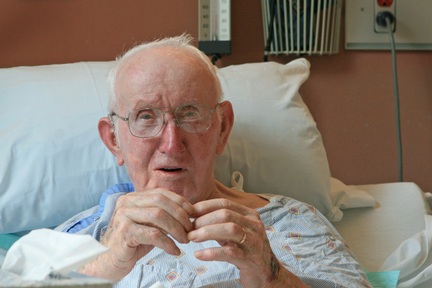End of life stage for those with dementia is 'forgotten' aspect of disease
Despite the positive work done raising awareness about dementia and living well with the disease, there should be a greater focus on improving the quality of end of life care.

As part of collaboration between Marie Curie and Alzheimer’s Society, ‘Living and Dying with Dementia – Barriers to Care’ has been put together which reveals the main barriers currently preventing people from accessing appropriate and high-quality care at the end of their lives.
The lack of quality support for people in the end of life phase of dementia has been labelled a ‘silent epidemic.’ Compared to the success of campaigns helping people to ‘live well’ with dementia and an increase in awareness about the disease, Marie Curie found inconsistencies in care standards and poor recognition of dementia as a terminal illness.
Phil McCarvill, head of policy and public affairs, at Marie Curie said: “End of life care for people with dementia remains a hidden aspect of health and social care in England so it is vital that we shine a light on the final stages of dementia to improve care and support for people and their families.
“I know from the personal experience of caring for my father that people with dementia have very specific needs. All too often, services do not respond to the needs of the individual. That is why we are calling on a number of organisations to work with Marie Curie and Alzheimer’s Society to improve care and support for people with dementia at the end of life.”
Until now care for terminal illness has been shaped to respond to the needs of people with cancer and Marie Curie wants core services helping people at the end of life to meet the needs of not only those with cancer, but other illnesses such as dementia. This includes understanding and responding to the diverse needs of those with the disease.
Jeremy Hughes, chief executive at Alzheimer’s Society said: “Dementia is frequently overlooked as being a terminal illness and as a consequence, there are unacceptable failures to prepare and plan for end of life care. Despite much attention on dementia in recent years, many people with dementia are not dying where they had hoped; others face meeting the end of their life in pain or without dignity.
“A lot needs to happen to improve care. Improving staff training and awareness is vital in order to help make people’s final days as good as they can be. Mapping this journey is difficult but considerations for end of life care for people with dementia are essential to meet the needs and dignity of each individual and their loved ones.”
The ‘Living and Dying with Dementia – Barriers to Care’ looks at the overlooked final stages of dementia and has drawn on research carried out by University College London (UCL.)
The research revealed inadequate quality of care which included poor pain management and a lack of care planning for end of life care. Poor access to palliative care, hospice care, funding and discrimination also cause extra barriers preventing people from accessing good care in the final stages of dementia.
Marie Curie and Alzheimer’s Society are aiming to bring together NHS organisations, social care bodies, royal colleges, charities, researchers and people with experience of dementia and end of life care, to plot out how to address the barriers and develop an action plan that each organisation can to sign up to.
The charities will meet a range of people with direct experiences of end of life dementia care to identify the practical steps to improve care and will provide information on progress made next December.
Latest News Analysis
 04-Sep-19
Extra £1.5 billion announced for social care in Chancellor's Spending Review
04-Sep-19
Extra £1.5 billion announced for social care in Chancellor's Spending Review
 02-Jul-19
Department of Health forced to rethink care homes' nursing rates after legal challenge
02-Jul-19
Department of Health forced to rethink care homes' nursing rates after legal challenge
 18-Jun-19
Overnight care workers forced to sleep in offices and told 'bring your own bedding'
18-Jun-19
Overnight care workers forced to sleep in offices and told 'bring your own bedding'
 14-Jun-19
Back in the closet: Third of care home staff have had no LGBT+ awareness training
14-Jun-19
Back in the closet: Third of care home staff have had no LGBT+ awareness training
 11-Jun-19
PM candidates on social care: Rory Stewart calls fixing care an 'unfinished revolution'
11-Jun-19
PM candidates on social care: Rory Stewart calls fixing care an 'unfinished revolution'